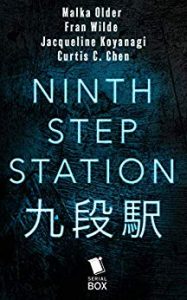Liz Bourke Reviews Ninth Step Station by Malka Older, Curtis C. Chen, Jacqueline Koyanagi, & Fran Wilde
 Ninth Step Station, Malka Older, Curtis C. Chen, Jacqueline Koyanagi, & Fran Wilde (Serial Box 978-1-68210-589-4 $13.99, 324pp eb) March 2019. Cover by Christine Barcellona.
Ninth Step Station, Malka Older, Curtis C. Chen, Jacqueline Koyanagi, & Fran Wilde (Serial Box 978-1-68210-589-4 $13.99, 324pp eb) March 2019. Cover by Christine Barcellona.
Ninth Step Station is one of two new science fiction serial offerings from publisher Serial Box this year. (The other is The Vela, starting in March.) Created by Malka Older and written by Older, Fran Wilde, Curtis C. Chen, & Jacqueline Koyanagi, Ninth Step Station comprises ten relatively short episodes that together add up to a season that’s about as long as a good-sized novel.
Ninth Step Station sets itself in a future Tokyo, a city divided after a Chinese invasion of Japan, whose political difficulties have been exacerbated by the natural disaster of an earthquake. Tokyo has become something like present-day Nicosia or Berlin before the reunification of East and West Germany: a city whose people have to live under the administration of mutually hostile polities. Besides the Chinese, part of Tokyo is administered by ASEAN (the Association of South-East Asian Nations) and part by a US peacekeeping force. But crime continues, and Ninth Step Station focuses on the work of police investigator Miyako Koreda, unwillingly paired with US peacekeeper Lt. Emma Higashi, as she attempts to keep order in a city that’s just waiting for the next outbreak of hostilities.
This future Tokyo, suffering from intermittent blackouts, its public transport divided by the city’s new borders, the personal and political ties of its populace strained in new and distressingly interesting ways, feels real and solid, atmospheric in the way of very few science fictional cities. Ninth Step Station is deeply influenced by the canons of cyberpunk, but updated with a more believably understated technology of the 21st century. This is a world where borders are enforced with drones and where body modification can be hacked by the unscrupulous, and also one where a fingerprints database has been destroyed in the earthquake and is only slowly being rebuilt.
(The least believable thing about Ninth Step Station, in fact, is the idea of the US as a trusted and trustworthy major partner for peacekeeping operations, and one that would invest a significant number of personnel in peacekeeping efforts. I believe the current major military contributors to UN peacekeeping missions include India, Bangladesh, Pakistan, Brazil, Jordan, and Ethiopia, but not the US, the UK, Canada, Australia, or New Zealand. But it is the Future(TM), so maybe the US’s outlet has changed.)
Across the ten episodes, Koreda and Higashi learn to work together (though Koreda finds it difficult to swallow her frustration with Higashi’s tendency to brandish a pistol) and Higashi identifies more and more with Tokyo-the-city and the concerns of its residents, and less – to a degree – with the concerns of her American boss, who’s manoeuvring for advantage, both personally and in geopolitical terms for the American state.
This is a crime procedural, albeit one where the politics of the setting intrudes very strongly into how (and if) each different case gets solved. The episodes are:
Episode 1: “The Faceless Body”, written by Malka Older, in which Koreda meets Higashi and the pair of them have to solve the murder of a man with no face on a Tokyo subway platform, and in which the reader is introduced to Higashi’s boss’s (Charles Beaufort Yardly III) interest in a set of containers hijacked by katana-wielding criminals and taken into the Chinese zone;
Episode 2: “The Bodiless Arm”, written by Fran Wilde, in which an arm found in a locker leads to a wider mystery;
Episode 3: “The Fallen Executive”, written by Curtis C. Chen. Koreda and Higashi investigate whether an executive locked in an apparently-empty suite died by suicide or murder;
Episode 4: “The Blackout Killer”, written by Jacqueline Koyanagi. People of Chinese extraction are being murdered during the city’s frequent blackouts. Is it political, or are Koreda and Higashi facing a serial killer?
Episode 5: “The Deadly Defection”, written by Malka Older. Higashi’s American boss experiences an assassination attempt and a potential defector shows up from the Chinese zone, having just killed the woman he alleges was his handler. Koreda and Higashi have to investigate whether this killing was murder or self-defence, hampered by political constraints.
Episode 6: “The Stolen Xiǎohái”, written by Curtis C. Chen. The daughter of a senior Chinese official is apparently kidnapped. Koreda and Higashi are joined by two intensely irritating Chinese cops for the investigation.
Episode 7: “The Loud Politician”, written by Fran Wilde, in which Koreda and Higashi investigate the murder of an outspoken feminist parliamentarian.
Episode 8: “The Clawed Limb”, written by Jacqueline Koyanagi. People with modified limbs commit crimes and claim that their arms (etc.) acted independently of their volition. It’s up to Koreda and Higashi to find out what’s going on.
Episode 9: “The Assassin’s Nest”, jointly written by Fran Wilde & Curtis C. Chen. Higashi’s old military superior officer is assassinated at a diplomatic event, and Koreda’s female lover (a resident of the Chinese zone) comes under suspicion of aiding in the assassination.
Episode 10: “The Foreign Mischief”, written by Malka Older. An attack on the Diet by a hard-line anti-foreign Japanese faction takes place, while at the same time, the Chinese advance the border of the Chinese zone, leading to fighting in the streets and a realignment of everyone’s priorities.
The episodes are told jointly from the perspectives of Emma Higashi and Miyako Koreda, with occasional scenes from other points of view. Higashi and Koreda are both interesting characters, with complicated lives and relationships. Higashi starts (and ends) a relationship with a Japanese colleague, and begins to suspect her US boss of not being entirely on the level, while also suspecting the entire Japanese police force (and Koreda) of having ties either to the Chinese or the anti-foreigner resistance. Koreda keeps quiet about her sexuality and her female lover (in the Chinese zone) in part from awareness of her colleagues’ homophobia and chauvinism and in part because she’s a private person, and suspects Higashi’s motives (and despairs of her sheer American-ness) even as they develop a good friendship and a strong working partnership. The background political situation develops over the course of the season, and complicates every aspect of life in this version of Tokyo.
On the whole, Ninth Step Station is both well and compellingly written, though there are a couple of episodes where the characterisation fluctuates from what has been established as “in character” for that individual. The dialogue is sometimes choppy, and occasionally some of the emotional weight of later episodes relies on the reader recollecting the importance of small, throw-away details in earlier ones.
These are minor criticisms, overall. Ninth Step Station is an ambitious and engaging work. It ends on a cliffhanger, and I seriously hope to see a second season continue the interesting work of the first.
Liz Bourke is a cranky queer person who reads books. She holds a Ph.D in Classics from Trinity College, Dublin. Her first book, Sleeping With Monsters, a collection of reviews and criticism, is out now from Aqueduct Press. Find her at her blog, her Patreon, or Twitter. She supports the work of the Irish Refugee Council and the Abortion Rights Campaign.
This review and more like it in the March 2019 issue of Locus.
 While you are here, please take a moment to support Locus with a one-time or recurring donation. We rely on reader donations to keep the magazine and site going, and would like to keep the site paywall free, but WE NEED YOUR FINANCIAL SUPPORT to continue quality coverage of the science fiction and fantasy field.
While you are here, please take a moment to support Locus with a one-time or recurring donation. We rely on reader donations to keep the magazine and site going, and would like to keep the site paywall free, but WE NEED YOUR FINANCIAL SUPPORT to continue quality coverage of the science fiction and fantasy field.




